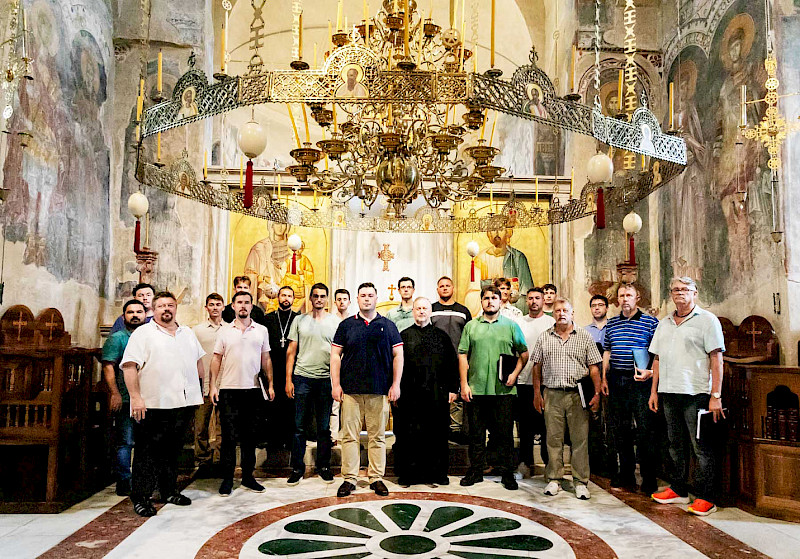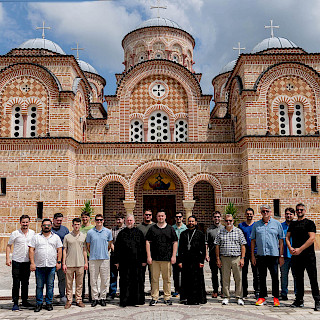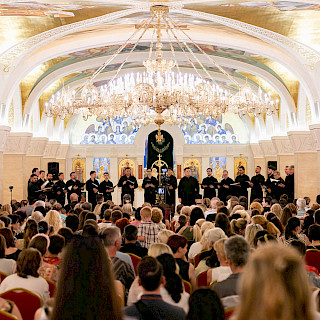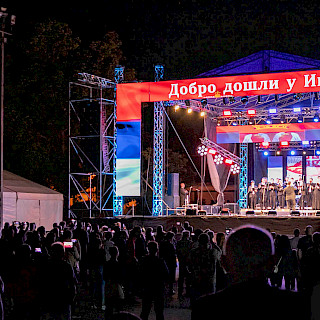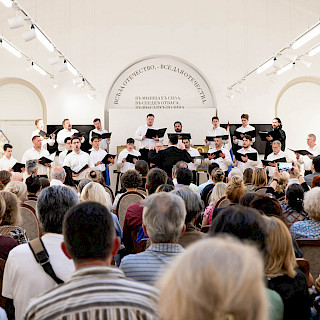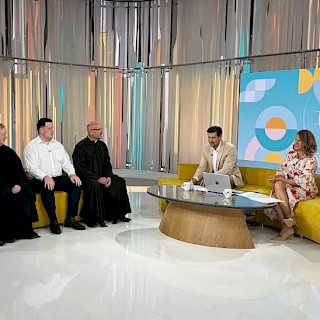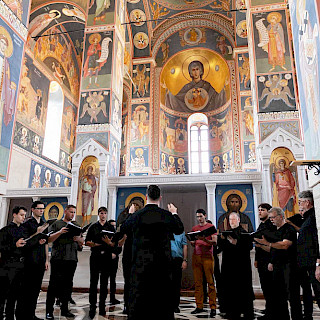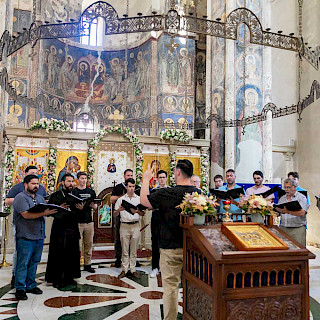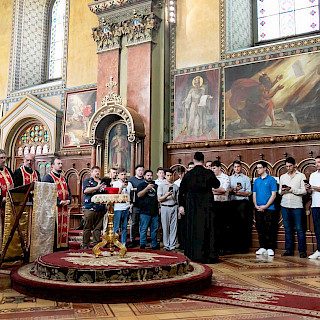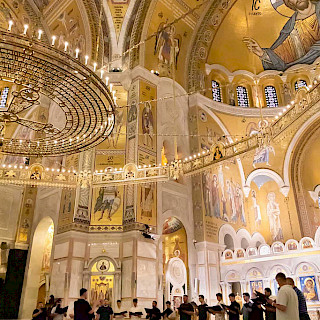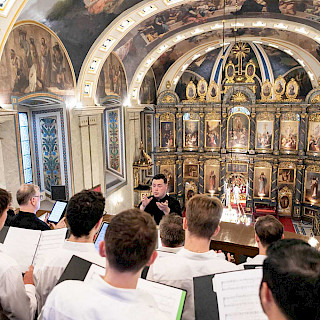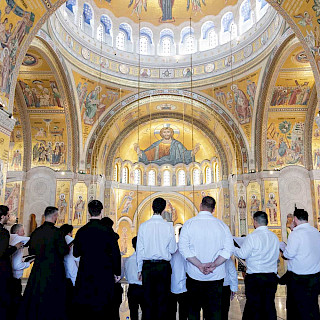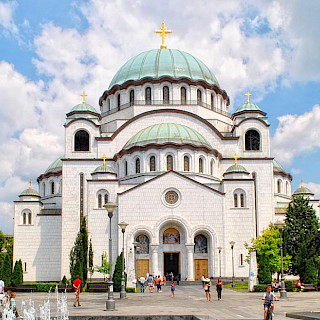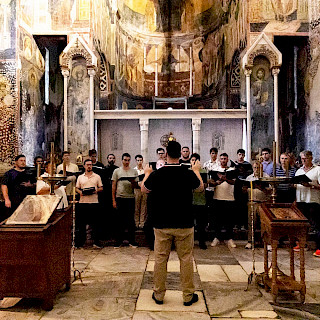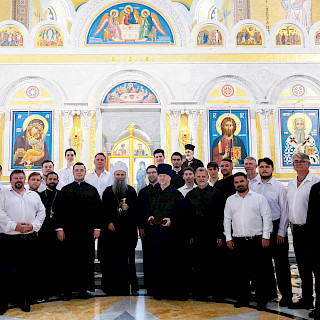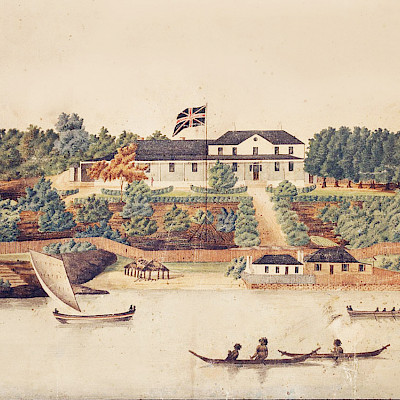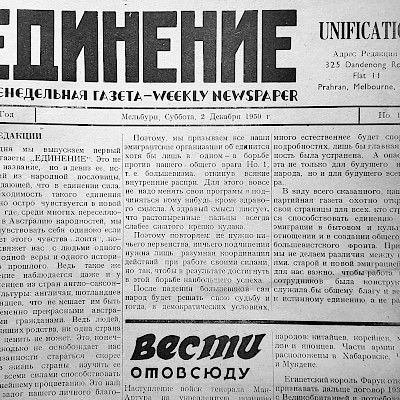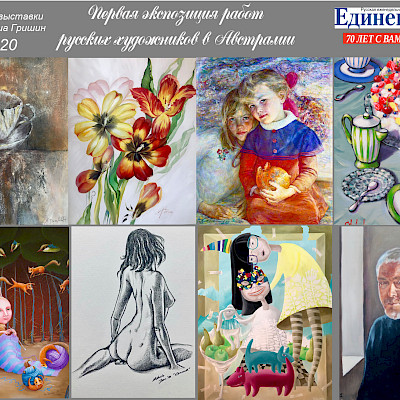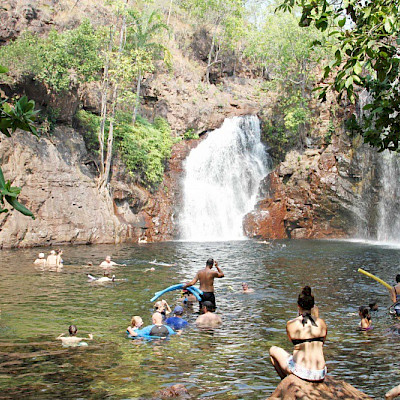Seven years ago, a new Russian Male Orthodox choir was founded in Australia. The choir, organized from parishioners of various churches in Sydney and other cities in Australia, includes many young people, mainly children and grandchildren of Russian emigrants who came to Australia 50-70 years ago. Recently, the choir members made a big trip to Serbia. The choir director Nektariy Kotlyarov tells the readers of "Unification" about this tour.
In June 2024, the Russian Orthodox Male Choir of Australia toured to Serbia over the course of 14 days where they were welcomed by thousands of Serbian people with open arms. The idea of travelling to Serbia came about in early 2023. The Russian Orthodox Male Choir of Australia received the blessing of our Archbishop George of Sydney Australia and New Zealand, and held meetings with the Serbian Metropolitan Siluan of the Australian and New Zealand Diocese. The choir then received a blessing from His Holiness Patriarch Porfirije of Serbia to travel there and then began planning the trip.
When we arrived in Serbia we were instantly welcomed with open arms. The hospitality and brotherly love shown by the Serbian people was really special. The aim of this trip was to see the many significant religious sites in this Orthodox country, sing services and concerts in various parts of the country, and experience the rich Serbian culture.
We traveled around by bus across almost all of Serbia. The land mass itself isn’t that big. Serbia can fit into New South Wales many times, but the terrain particularly outside of the major cities consists of steep mountains and valleys - so beautiful, but on a big bus, it made the trips to each monastery sometimes 3 to 4 hours long. Serbia has over 200 monasteries, many of which were built in the 13th and 14th centuries by previous Kings of Serbia. In saying that, we of course could not see everything in the short period we were there for but we tried our best.
In total we visited and sang at 15 monasteries and towns located outside of major cities: Manasija, Studenica, Zica, Kraljevo, Valjevo, Celje, Lelic, Ravanica, Ravanica-Vrdnik, Kovilj, Grgeteg, Velika Remata, Surcin, Backa Palanka, Indija - quite a lot to do in 14 days! Of course we also sang in the cities Belgrade, Novi Sad and Sremski Karlovci.
Some of the highlights of the trip include:
Venerating many full relics of great saints of the Serbian church such as St. Iustin Popovic, St. Nikolaj Velimirović, St. Price Lazar, St. King Stefan - with their relics being completely opened up for us. We all prayed for our families, friends, and many people back here in Australia.
Singing a spiritual concert in the St. Nicholas Cathedral located in Sremski Karlovci. This is the church where our Bishops served the first Liturgy and had their first meeting (архиерейский собор) abroad after the revolution occurred, more than 100 years ago. To know that ROCOR began in this very church and we had the opportunity to sing in it was very special. We also served a панихида to Metropolitan Anthony Hrapovitsky (founder of ROCOR) in this Cathedral.
After singing a spiritual concert in Surcin, a small town located outside of Belgrade, I had a few TV and radio interviews, but I was also introduced to an author. The author was writing a book on the history of Surcin - he told me that he wants to dedicate the last section of the book to our choirs concert.
We sang a folk song concert at the Summer Music Festival in Indija, a town between Belgrade and Novi Sad. There was a big outdoor professional stage set up for us. We were the main act and had hundreds of people attend.
We also put on a folk song concert at the Ruski Dom in Belgrade which was built by the emigre generation who fled Russia during the revolution, another significant place for us to perform in where hundreds of people gathered and overfilled the venue - some people remained outside as there was no more room to sit or stand
We also sang many Liturgies in significant locations, such as the Ravanica-Vrdnik Monastery for Vidovdan - the National Serbian day of remembrance for Saint Prince Lazar and the other holy martyrs who fell during the battle of Kosovo in 1389.
The most memorable Liturgy for us, however, was the Divine Liturgy on the final day in Serbia where we were invited to sing in the St. Sava Cathedral in Belgrade, one of the largest Orthodox churches in the world, larger than all other churches in Russia. As well as this, the liturgy was presided by Serbian Patriarch Porfirije. The night before this Liturgy we had our final concert in the Crypt of St. Sava - a church located underneath the big Cathedral which was attended by close to 500 people. For the Patriachal Liturgy the following day, the local clergy estimated that over 800 people were in attendance. It is by far, the most magnificent Cathedral - all mosaic on the inside, designed by I believe a Russian architect. Even though we were all eager to sing in this church, we quickly discovered that it was acoustically challenging due to the grand size of the church. After singing a big chord, you could count to almost 30 seconds and still hear the reverberation. Diction for us here was also really important so that the text we sang would not get lost in the acoustics. At the end of the Patriarchal Liturgy, we were invited to the front of the church to greet the Patriarch, receive his blessing, and he said to us in Russian “вы лучший хор”. The Patriarch then invited us to a festive banquet after the Liturgy. During the banquet, the Patriarch asked us to sing the Russian folk song Конь which we did.
Overall, there are no words to describe the experience we had. Every concert we sang, the crowd applauded for minutes at a time, and at the end of each concert we received a standing ovation with applause lasting until we had all walked out of the church or hall that we had performed in. We were told that the impact we left on the people of Serbia was unprecedented. During our concerts and services many people were in tears. Everyone was very appreciative, and we have many invitations to return.
The majority of our choir consists of youth who are in their teens and 20’s. The experience this once in a lifetime trip gave them was eye-opening and inspiring. God willing, this will inspire the younger choristers in our choir to continue praying, actively participating in church life, and praising God through singing, and promoting our faith and culture, which is the mission of our choir.
Nektarij Kotliarov



